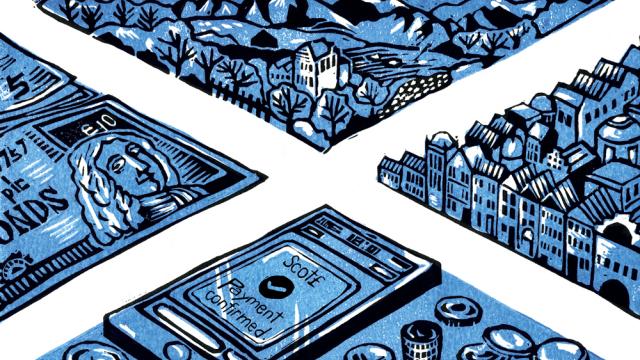Will The ScotPound Succeed As A Parallel Currency?
By Steve Rushton
07 November, 2015
Occupy.com

Many people think money makes the world go around, or the global economy at least. They consider it in a similar way that gravity holds the planet in orbit. But this is simply not fact. Money’s creation is no law of nature.
The vast majority of money is created as debt when private banks issue loans. The U.S. Federal Reserve and the Bank of England admit this point. Replicated by most currencies, 97% of U.K. £-Sterling is created by private banks. The Bank of England only creates 3% of Sterling as coins and notes.
This monetary system, as we're aware, serves the rich: not only can they make money for nothing, but they then charge interest on top. It's no wonder seven of the world's 10 largest corporations are banks or financial institutions. The way inequality is woven into the system begs the question. How could we create money to serve the 99%?
Welcome to ScotPound
A report produced by the New Economics Foundation and Common Weal, entitled "ScotPound: digital money for the common good,"offers a progressive way forward. The study suggests a parallel digital currency for Scotland could “stimulate local economies, create a level playing field for small businesses, and support social justice for all its citizens.”
Such a currency would also overcome a key hurdle to Scottish independence, as the currency question featured heavily in the voter referendum last year. The U.K. government stated Scotland would not be allowed to use the pound if it became independent. Despite this being an unfounded assertion, the fear it generated was cited as a key factor that led to the No vote.
The ScotPound report asserts that an independent Scotland could use the pound if it wants to. But it goes further. The authors assert that even without another independence vote and using powers held by the devolved Parliament, Scotland could start a parallel currency today. Not needing to depend on U.K. Sterling is just one of the advantages the report suggests would build confidence for an empowered Scotland.
Why a New Currency, and How it Will Work
The ScotPound (S£) project aims to remedy many of the systemic crises emergent from money and its creation. The proposal focuses on setting up a new not-for-profit bank, BancaAlba, to administer the digital money with a free-to-use payment system. Every Scottish citizen would be given S£250 to start – created by BancaAlba out of thin air, just as private banks currently create money when they make loans.
The money would be the equivalent value of U.K.£, but it would not be transferable to other currencies or countries. In this way it could not be offshored to avoid or evade taxes. Instead it would be used to buy Scottish goods and services or pay taxes to the Scottish government.
Money from nowhere may sound beyond logic. But the report clearly states, with evidence, why this is no crazier system than the way money is now created by banks. First off, to make it work, Scottish businesses would need to sign up. The chance to pay taxes with the currency creates a major incentive for them. The free digital payment system is offered as another encouragement to initiate the ScotPound's use. Currently, small businesses have a harder time accessing digital payments because banks charge them far more for such a service, proportionally, than they charge large corporations.
A ScotPound is blue-sky thinking about money. But as the report shows, this project stands on the shoulders of similar, albeit smaller, parallel currencies that have come before. The English city of Bristol has the Bristol-Pound, with over £700,000 in circulation. Its success, like the Sardex of Sardinia and the Chiemgauer of Germany, is due in part to the fact that the currencies are designed to circulate more quickly compared to debt-created money. Socially designed money is designed to be used, not hoarded.
According to the authors, the new Scottish currency is aimed to empower Scottish society. The idea of establishing a national bank for the people strikes many as common sense, yet one that radically departs from business as usual. The proposal suggests BancaAlba should be not-for-profit, politically impartial, with democratic governance and full transparency.
Running contrary to the mission of central banks like the Bank of England and the U.S. Fed, which delivered immense sums of capital to the very same banks that collapsed the global economy, the ScotPound would enable Scotland to shift away from big finance, abandon austerity policies, and inject money directly into the productive economy. The report explores ways that parallel currencies like the ScotPound can bolster economies against future shocks and crises – revealing that not only is another Scotland possible, but another money is possible as well.

